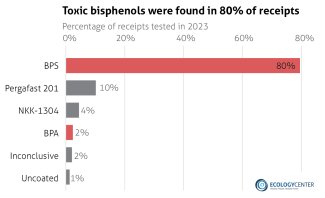Study background
The Ecology Center's Healthy Stuff Lab partnered with TV stations at Cox Media Group, Inc. to test 245 receipts from businesses in eight U.S. cities (Orlando, Jacksonville, Atlanta, Charlotte, Boston, Pittsburgh, Dayton, and Seattle.) This 2023 study is a follow-up to our earlier study of 571 receipts from two dozen states nationwide. In both studies, the businesses sampled included national chains and smaller local and regional stores.
Receipts, nearly all of which are made of a specially coated paper called thermal paper, were mailed to the Ecology Center and tested with FTIR. This test identified the primary color developer chemical used in each receipt.
Bisphenol developers, specifically bisphenol S (BPS) and bisphenol A (BPA), are known health hazards. In contrast, the various alternative developers in use are, in some cases, environmental hazards and need more evaluation.
Key Findings
- 4 out of 5 receipts tested had toxic BPS
- As shown in Figure 1, 80% of the tested receipts were coated with BPS, 10% with Pergafast 201, 4% with NKK-1304, 2% with BPA, 2% with an unidentified developer, and 1% were uncoated, plain paper. Pergafast 201 and NKK-1304 are non-bisphenol alternatives.
- The results are similar to the 2022 study, which found 85% BPS, 12% Pergafast 201, and roughly 3% other alternative developers, including NKK-1304. The use of NKK-1304 has slightly increased in 2023, but more sampling is needed to determine if this is a consistent trend.
- As we saw in 2022, smaller businesses with a local or regional reach (those with stores in up to 10 states) were more likely to use receipts coated with bisphenols. Large national chains still had the majority of BPS but were more likely than smaller businesses to have switched to alternatives.

Solutions
For retailers
- Offer digital receipts
- Switch receipt paper to non-bisphenol options
For workers
- Avoid touching receipts with wet hands
- Wear gloves when handling receipts
- Wash hands after handling receipts
For shoppers
- Ask lawmakers and stores to ban BPS
- Decline physical receipts
- Wash hands after handling receipts
- Fold receipt printed side in
- Don’t put receipts in recycle bins
In the News

Nationwide news reports are helping to alert the public to the harmful chemicals coating the receipts most commonly handed out from retailers.
As a hormone-disrupting chemical, BPS is linked to fetal development issues, reproductive impairment, type 2 diabetes, thyroid conditions, and other health concerns. It can pass from the receipt through the skin and into the bloodstream. Exposure to BPS is particularly problematic for cashiers who handle receipts all day and for pregnant women who are at greater risk of adverse health outcomes from BPS exposure.


